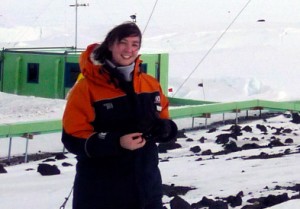
Sarah Ugalde
Antarctica is the harshest place on Earth, but did you know scientists have been studying Antarctic’s land, atmosphere, and ice for over a century?
As the coldest, windiest, and driest continent on Earth, Antarctica has many hidden secrets about our planet’s history, present, and possibly, our future.
As a kid, I was always out of the house on some kind of an adventure, and never dreamt I would some day go to Antarctica. I loved spending time with mates, camping or swimming in the river, but I learnt very quickly that I enjoyed challenging myself and those around me.
After school I moved to the Australian Capital Territory to study at University of Canberra, where I enrolled in a Bachelor of Environmental Science. At university I developed a taste for practical science, and undertook a range of fun and unique university and volunteer projects, including working with inland carpet pythons, endangered lizards and dragons, burrowing spiders, tree-living marsupials, native rats, and marine animals. I love that kind of work – anything where I can get my hands dirty, meet new people, or see some amazing creatures and places.
After graduation, I decided to undertake a PhD in Antarctic science at the University of Tasmania. Although Antarctica seems like a white desert, there are actually a lot of plants and animals living within the ice. My job is to piece together exactly what lives in the ice of Antarctica, and why they are so important to us.
Last year, I was lucky enough to spend two months camping in a remote area of Antarctica working on sea ice biology. It was such a great experience, and very different to how we normally live! This year, I will be going down to Antarctica again, but this time I will be based on the Australian Antarctic ship, the Aurora Australis.
Throughout my studies, I have had so many opportunities to work with strange and wonderful creatures, and have visited some incredible places. But science is a chance to search for important answers, which can help us in many ways. Best of all, we can do something different everyday, and celebrate those moments, although sometimes few and far between, of success and real accomplishment.
For more information: www.acecrc.org.au; www.antarctica.gov.au
